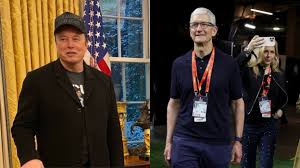Elon Musk had given Apple an offer of $5 Billion, Tim Cook refused – Now Happy Satellite War!
When Apple was preparing to launch its new iPhone 14 in 2022, Elon Musk gave a dazzling offer. Musk gave Tim Cook an ultimatum of 72 hours: either Apple should make a deal with SpaceX for satellite connectivity for $5 billion, or Musk himself will launch a competing service – which will be directly compatible with iPhones.
Musk’s Mega Offer: $5 Billion and a dazzling warning
Elon Musk’s offer was simple but impactful: SpaceX will provide satellite connectivity to Apple with an upfront payment of $5 billion. In addition, after 18 months of exclusivity, Apple would have to pay another $1 billion every year. Musk was confident that Apple would not be able to refuse this deal.

But Tim Cook rejected Musk’s offer. Apple instead chose to partner with Globalstar – a small satellite company whose network is considered outdated compared to Musk’s Starlink.
Starlink Direct to Cell: Musk’s answer
Immediately after Tim Cook’s refusal, Elon Musk fulfilled his promise. SpaceX, along with T-Mobile, launched the Starlink Direct to Cell service, whose aim was to directly connect smartphones to satellites. This meant that T-Mobile users, including iPhone users, could benefit from satellite connectivity without any extra hardware.
Apple’s iPhones were limited to Globalstar’s network, while the Starlink-T-Mobile combination offered users a stronger and widespread connectivity.
Legal Battle: SpaceX vs Globalstar
The outside tussle didn’t end there. In 2022, SpaceX filed a legal challenge against Globalstar, in which Musk’s company claimed that Globalstar wasn’t properly using its allotted wireless spectrum. And it was preventing other players like SpaceX from entering the market.
This is the same spectrum that Apple uses for satellite services for its iPhones. If SpaceX wins this legal battle, Apple may have to rethink its entire satellite strategy.
Concerns within Apple
Not just from outside, Apple is also raising concerns about its partnership with Globalstar. Senior executives like Craig Federighi (Software Chief) and Adrian Perica (Corporate Development Head) have expressed their concerns about Globalstar’s outdated network.

Apple’s Risky Investment
According to reports, Globalstar’s existing infrastructure is slow and no major improvement is expected from the expansion plan in the next 10 years. Some executives also fear Apple could be subject to regulations similar to those for telecom carriers if it delves too deeply into satellite services.
Still, Apple has invested about $1.7 billion in Globalstar, of which $1.1 billion is going toward launching new satellites. Apple has shown it is committed to its satellite future, whether there is competition or internal resistance.
Conclusion: The Satellite Race Has Just Begun
This clash between Elon Musk and Tim Cook marks the beginning of a new era for the tech world – the era of satellite connectivity for smartphones. On one side is Musk’s aggressive approach and powerful infrastructure, and on the other is Apple’s conservative but focused vision.
Now that Starlink has made its mark in the market and even Apple’s internal executives are feeling uneasy, it would not be wrong to say that the satellite war has just begun. This competition is going to get even more intense in the next few years – and its impact will directly fall on everyone’s mobile experience.
Stay tuned, because this is a battle between two tech titans, and more than winning, it is about the control of future connectivity.
